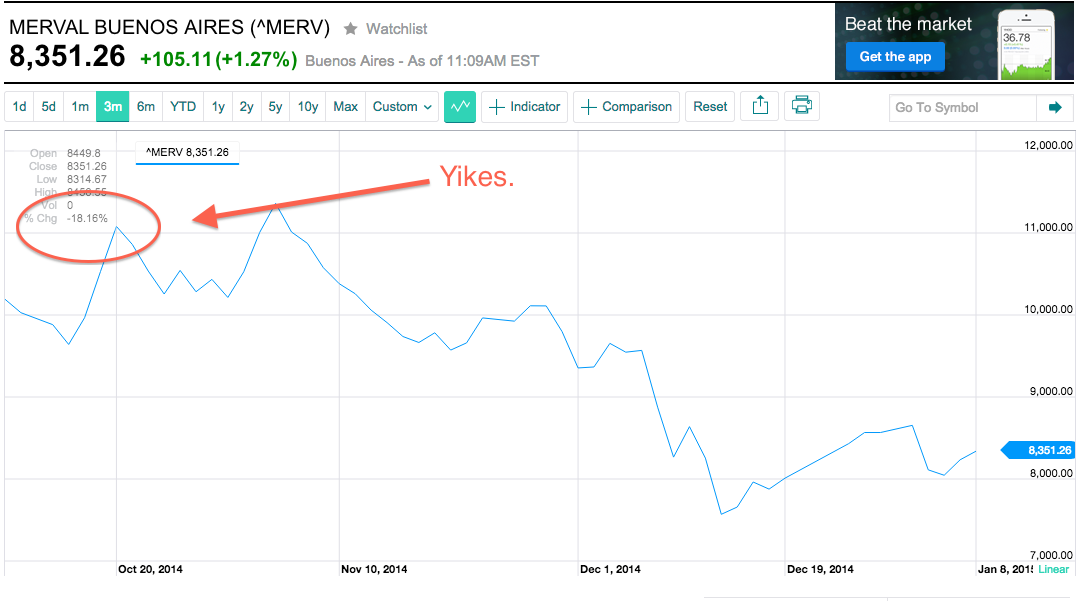BUFFETT Stock Market And Economy Business Insider
Post on: 15 Июль, 2015 No Comment

20shot%202014-03-27%20at%204.28.09%20pm.png /% St. Louis Fed Stocks (red) and GDP (blue), 1966-1982
Yes, stocks could keep going up, especially if the Fed keeps frantically pumping out money. But most valid valuation measures suggest that stocks are radically overvalued. And, in the past, radical overvaluation has led to crappy long-term stock performance.
(Current prices suggest that stocks will only deliver returns of about 3% per year for the next decade. That’s a far cry from the 10% long-term average.)
But lots of folks are bullish about stocks these days, despite these valuation measures.
And one of the arguments these bullish folks trot out when I mention my concerns is that the economy is growing nicely and is expected to continue to grow for the foreseeable future. And, hey, if the economy continues to grow, then stocks will go up!
That argument sounds compelling.
But there are two big flaws in it.
First, just because economists expect the economy to keep growing doesn’t mean that the economy will actually keep growing. Economists have a terrible track record when it comes to predicting recessions (they almost never see them coming).
Second, and more importantly, even if the economy keeps growing, that doesn’t mean that stocks will go up.
Don’t believe it?
Let’s go to the Oracle, Warren Buffett.
Back in 1999, Warren Buffett wrote an amazing article for Fortune in which he quietly reminded investors that the remarkable stock performance of 1982-1999 (17% per year) was not likely to continue indefinitely. As usual, Buffett was right. Less than a year after he wrote his article, the market crashed, and 15 years later, it’s still not much higher than it was then.
Anyway, in his article, which you should read. Buffett reminded everyone that stocks and the economy are not always correlated.
In fact, he pointed out, there have been many long periods in history in which stocks and the economy have not been correlated at all.
Here’s Mr. B, writing in 1999:
Now, to get some historical perspective, let’s look back at the 34 years before this one—and here we are going to see an almost Biblical kind of symmetry, in the sense of lean years and fat years—to observe what happened in the stock market. Take, to begin with, the first 17 years of the period, from the end of 1964 through 1981. Here’s what took place in that interval:
DOW JONES INDUSTRIAL AVERAGE
Dec. 31, 1964: 874.12
Dec. 31, 1981: 875.00
Now I’m known as a long-term investor and a patient guy, but that is not my idea of a big move.
And here’s a major and very opposite fact: During that same 17 years, the GDP of the U.S.—that is, the business being done in this country—almost quintupled, rising by 370%. Or, if we look at another measure, the sales of the FORTUNE 500 (a changing mix of companies, of course) more than sextupled. And yet the Dow went exactly nowhere.
Catch that?
For the 17 years through 1981, the economy grew by 5X. And stocks were flat.
Yes, you say, but that’s because of interest rates. In the 17 years through 1981, interest rates skyrocketed from low to super-high and inflation soared.
That’s true!
But what makes you so certain that interest rates and inflation won’t soon do the exact same thing again?
In any event, if you think stocks are going to keep going up because interest rates are going to keep going down (somehow, despite the fact that they’re already super-low), then say so! Don’t go around making bogus arguments that stocks will go up if the economy grows.
It just ain’t necessarily so!
NOW WATCH: How To Invest Like Warren Buffett














